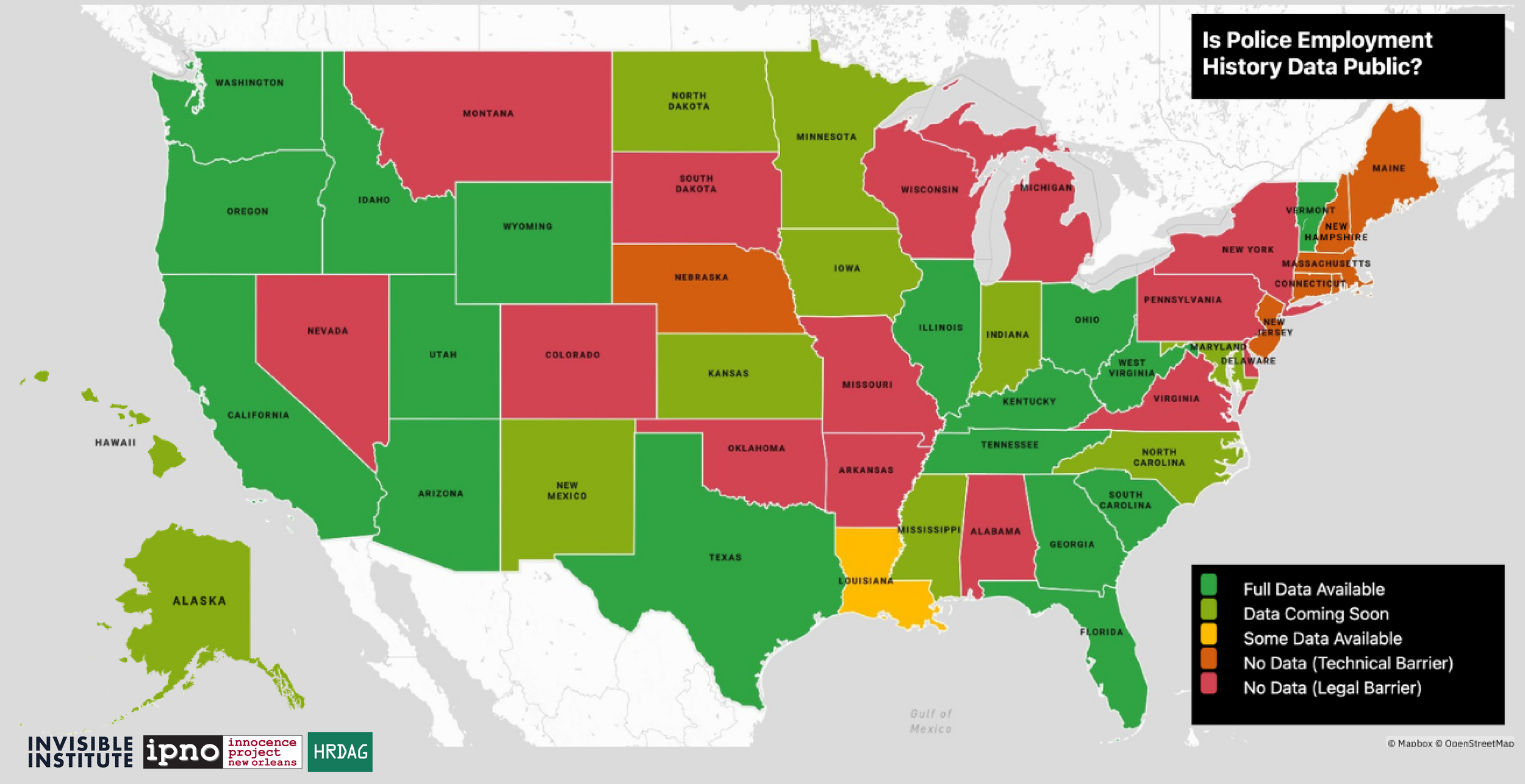NATIONAL POLICE INDEX
The National Police Index is a data tool showing police employment history data obtained from state police training and certification boards across the U.S. All but one state has such a system.
This is a public data project led by Sam Stecklow of Invisible Institute, a nonprofit public accountability journalism organization based in Chicago, created in partnership with Ayyub Ibrahim of the Louisiana Law Enforcement Accountability Database of Innocence Project New Orleans, and Tarak Shah of the Human Rights Data Analysis Group.
Access to this data helps show potential “wandering officers,” and is intended for use by residents, journalists, researchers, attorneys, and other stakeholders. Information about the age, source, and other specifics for each state is available on each page.
Each state’s database is closed to the others; names are common, and an officer’s name appearing in two states does not necessarily mean they are the same person. Specific records should be sought from state training boards and individual police departments to confirm the identity of an individual whose name appears in multiple states.
In total, 27 states have released centralized employment history data, 17 of which are currently represented on the data tool. In addition, several states have released subsets of this data in their own lookup tools: Illinois, Massachusetts, Minnesota, Ohio, Oregon, and Texas.
The national tool was developed in partnership with Innocence Project New Orleans who developed the Louisiana Law Enforcement Accountability Database, and the Human Rights Data Analysis Group, a longtime collaborator of Invisible Institute.
There remain limitations to this data, including factors such as states that have barred the release of this data and the lack of a national unique ID for every officer in the country. Without a unique ID, one cannot assume someone with the same name or even birth year is the same officer. If you wanted to verify that an officer is the same, you’d have to go to the state’s Police/Peace Officer Standards and Training (POST) to ask for the officer’s employment record and any record that shows if they transferred from another state.”
Recent Reporting
State-by-state availability breakdown:
-
-
Alaska
Washington, D.C.
Hawaii
Idaho
Iowa
Indiana
Kansas
Minnesota
Mississippi
New Mexico
North Dakota
North Carolina -
Connecticut
Maine
Massachusetts
Nebraska
New Hampshire
New Jersey
Rhode Island -
The data files were collected over the course of over two years by a coalition of news and legal organizations. In addition to Invisible Institute, these included reporters, students, attorneys, and others with Big Local News at Stanford, CBS News, Hearst Newspapers, California Reporting Project, Howard Center for Investigative Journalism at the University of Maryland, ABC Owned & Operated Stations, American Public Media Research Lab, WPLN, Utah Investigative Journalism Project/Utah Freedom of Information Hotline, University of North Carolina at Chapel Hill, Oregon Public Broadcasting, Washington City Paper/George Washington University Public Justice Advocacy Clinic, Tony Webster, and Mirror Indy.
Efforts are being and were made to obtain data in states that have made it inaccessible by Invisible Institute and Colorado Springs Gazette/Reporters Committee for Freedom of the Press, Detroit Metro Times/University of Michigan Civil Rights Litigation Initiative, Delaware Call/ACLU of Delaware, Hearst Newspapers, MuckRock/University of Virginia First Amendment Clinic, The Badger Project/Wisconsin Transparency Project/University of Illinois First Amendment Clinic, Louisiana Law Enforcement Accountability Database/Innocence Project New Orleans, AL.com, Arkansas Advocate, The Frontier, SpotlightPA/Pennsylvania NewsMedia Association, and Sioux Falls Argus Leader.




